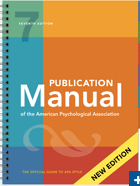 Like many others, I have been eagerly awaiting the release of the the 7th edition of the Publication Manual of the American Psychological Association (affectionally known by millions as the APA Manual). I was thrilled to read the press release saying its launch has been scheduled for October 2019. Then it occurred to me that this may be problematic from an academic integrity perspective. It is important for educators and institutions to take a supportive, ethical, and instructive approach to the adoption of the latest edition of the manual. Here are some ways to do that:
Like many others, I have been eagerly awaiting the release of the the 7th edition of the Publication Manual of the American Psychological Association (affectionally known by millions as the APA Manual). I was thrilled to read the press release saying its launch has been scheduled for October 2019. Then it occurred to me that this may be problematic from an academic integrity perspective. It is important for educators and institutions to take a supportive, ethical, and instructive approach to the adoption of the latest edition of the manual. Here are some ways to do that:
Recommendations for Instructors
- Talk to your students about the release of the 7th edition. This is an excellent reason to review citing and referencing expectations with students.
- Talk to administrators about what is expected of you with regards to when and how to adopt the 7th edition of the manual. It may make more sense to start and finish the term with consistent use of the same edition of the manual and transition to a new manual at the start of a new term.
Recommendations for Institutions
- Develop and deliver campus-wide training programs on the differences between the 6th and 7th editions of the manual. Students, faculty and others will need explicit and supportive instruction on what’s new and how to adapt to the norms of the new edition.
- Develop a systematic plan for campus-wide adoption of the 7th edition. Neither instructional staff nor students should be expected to buy a new manual and adopt it during the middle of a term. This could result in both a financial burden and unnecessary stress for everyone involved. It should be OK to stick with the 6th edition of the manual for the fall term (or the spring 2019 semester for the southern hemisphere), so everyone is using the same version consistently in courses. There can (and should) be a period of transition while students and others can learn the details of the latest version in time for start of the next term. There should be clear communication to students about when they are expected to fully adopt the 7th edition, and it should not be in the middle of term.
- Develop a unified and supportive institutional stance towards ethical adoption of the latest edition, casting a particular lens to academic integrity breaches and policy. It is imperative that students not be penalized for academic misconduct for failing follow 7th edition in the fall 2019 semester. (This includes not being penalized for having two spaces after a period!) It is important to give students, educators, administrators and others time to learn the new conventions that with come with the latest edition.
This is an exciting time for everyone whose work intersects with the APA manual in a variety of ways, including citing, referencing and academic writing. It is important to create supportive and planned approaches to adoption of the new edition in ways that emphasize teaching, learning and the development of research and writing skills.
______________________________________________________
Share or Tweet this: 7th Ed. APA Manual – An Academic Integrity Response https://wp.me/pNAh3-2nQ
This blog has had over 2 million views thanks to readers like you. If you enjoyed this post, please “like” it or share it on social media. Thanks!
Sarah Elaine Eaton is a faculty member in the Werklund School of Education, University of Calgary, Canada. Opinions are my own and do not represent those of the Werklund School of Education or the University of Calgary.



 Posted by Sarah Elaine Eaton, Ph.D.
Posted by Sarah Elaine Eaton, Ph.D.  My colleague, Roswita Dressler and I have just had a new paper published. It all started when I was at an academic integrity conference a couple of years back. I was sitting next to a colleague who works in a language other than English (LOTE). The colleague suggested that contract cheating (e.g. essay mills and other forms of outsourced academic work) was a problem of the English-speaking world, asserting that there simply wouldn’t be enough of a market in other languages.
My colleague, Roswita Dressler and I have just had a new paper published. It all started when I was at an academic integrity conference a couple of years back. I was sitting next to a colleague who works in a language other than English (LOTE). The colleague suggested that contract cheating (e.g. essay mills and other forms of outsourced academic work) was a problem of the English-speaking world, asserting that there simply wouldn’t be enough of a market in other languages.


You must be logged in to post a comment.